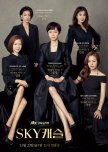An Unforgiving Mirror of Ambition and Parental Pressure
SKY Castle is a hauntingly brilliant drama that dives deep into the darkest corners of parental ambition, academic pressure, and the fragile line between love and control. Set in a luxurious neighborhood where South Korea’s elite doctors and professors reside, the story follows four mothers—Han Seo Jin, Noh Seung Hye, Jin Jin Hee, and Lee Myung Joo—each fighting with silent desperation to secure their children’s futures at the top universities, especially Seoul National University. But what begins as a simple tale of academic competition quickly evolves into a complex web of secrets, psychological warfare, and emotional breakdowns.
The arrival of Lee Soo Im and her nonconforming, more down-to-earth family disrupts the fragile ecosystem of SKY Castle. Soo Im’s presence challenges the other mothers, who are used to controlling every detail of their children’s lives. She questions not only their parenting styles but her own choices, especially as she begins to uncover what truly happened to the family that lived in her new home before her—the mysterious case of Myung Joo’s family and their ties to the chillingly calm college coordinator, Kim Joo Young.
What makes SKY Castle so powerful is how universally it speaks to the cost of success and the danger of tying a child’s worth to academic achievement. The mothers in this story are not villains, though they often act ruthlessly. They are women shaped by a system that equates prestige with happiness, and they have internalized that belief so deeply that they lose sight of the people their children actually are. Their motivations stem from fear—fear of failure, of losing status, of being seen as “less.”
Each character embodies a different response to this system: Han Seo Jin, with her double life and desperate need to maintain control; Noh Seung Hye, who begins to question everything she once believed; Jin Jin Hee, who blindly follows the advice of others just to stay in the race; and Lee Soo Im, who walks into this world like a quiet storm, full of compassion but slowly pushed to her own moral limits. And then there's Kim Joo Young, a character so unnervingly calm and calculated that she personifies the ruthless machinery behind the façade of academic excellence.
The children are, in many ways, the heart of the series. They are intelligent, talented, and entirely human—yet crushed under the weight of their parents' unrelenting expectations. Their anxiety, depression, rebellion, and even obedience feel raw and familiar. Watching them struggle isn’t easy, but it’s necessary.
SKY Castle isn’t just a drama—it’s a slow-burning psychological exploration of how ambition can erode relationships, ethics, and even love. It's not only about South Korea’s education culture, but a broader, more universal message: when success becomes everything, humanity is the first thing we lose.
The show is stylish, suspenseful, and brutally honest. It holds up a mirror to society and quietly asks, “What are we really doing to our children in the name of love?” The answer it gives back is not comfortable, but it is unforgettable.
The arrival of Lee Soo Im and her nonconforming, more down-to-earth family disrupts the fragile ecosystem of SKY Castle. Soo Im’s presence challenges the other mothers, who are used to controlling every detail of their children’s lives. She questions not only their parenting styles but her own choices, especially as she begins to uncover what truly happened to the family that lived in her new home before her—the mysterious case of Myung Joo’s family and their ties to the chillingly calm college coordinator, Kim Joo Young.
What makes SKY Castle so powerful is how universally it speaks to the cost of success and the danger of tying a child’s worth to academic achievement. The mothers in this story are not villains, though they often act ruthlessly. They are women shaped by a system that equates prestige with happiness, and they have internalized that belief so deeply that they lose sight of the people their children actually are. Their motivations stem from fear—fear of failure, of losing status, of being seen as “less.”
Each character embodies a different response to this system: Han Seo Jin, with her double life and desperate need to maintain control; Noh Seung Hye, who begins to question everything she once believed; Jin Jin Hee, who blindly follows the advice of others just to stay in the race; and Lee Soo Im, who walks into this world like a quiet storm, full of compassion but slowly pushed to her own moral limits. And then there's Kim Joo Young, a character so unnervingly calm and calculated that she personifies the ruthless machinery behind the façade of academic excellence.
The children are, in many ways, the heart of the series. They are intelligent, talented, and entirely human—yet crushed under the weight of their parents' unrelenting expectations. Their anxiety, depression, rebellion, and even obedience feel raw and familiar. Watching them struggle isn’t easy, but it’s necessary.
SKY Castle isn’t just a drama—it’s a slow-burning psychological exploration of how ambition can erode relationships, ethics, and even love. It's not only about South Korea’s education culture, but a broader, more universal message: when success becomes everything, humanity is the first thing we lose.
The show is stylish, suspenseful, and brutally honest. It holds up a mirror to society and quietly asks, “What are we really doing to our children in the name of love?” The answer it gives back is not comfortable, but it is unforgettable.
Was this review helpful to you?
























